School Profile
Brief History of St. Paul University Dumaguete
In 1904, October 29, the Sisters of St. Paul of Chartres established its first Foundation in the Philippines in Dumaguete, Negros Oriental, upon the invitation of the Most Reverend Frederick Zadok Rooker of the Diocese of Iloilo, to which Dumaguete then belonged. Seven SPC Sisters landed on the shores of Dumaguete knowing neither language nor culture, except the one supreme language of the heart, “Caritas Christi Urget Nos.”
The Lord had wonderfully blessed their poor and humble beginnings with a succession of Foundations opened after Dumaguete. More invitations followed and so more Sisters continued to bear fruit in their ministry. Like the falling of the grain of wheat into the ground, the premier school brought forth several schools, hospitals, health and pastoral care centers, and communities of Sisters of St. Paul of Chartres throughout the country.
St. Paul University Dumaguete (SPUD), now more than 100 years of service to humanity, is truly blessed with momentous events. It started as the Instituto de San Pablo, an exclusive school for girls - the first Catholic school in the province. Indeed, the school has gone a long way--ever responsive to the needs of the Dumagueteños, in particular, and the Filipinos in general. It has grown and expanded producing holistic, integral graduates who have become authentic and responsible leaders in society and in their respective workplace.
Now more than 100 years of service to humanity, the Community flourished with every challenge they encountered. Like twigs in a hurricane, they swayed but did not break, weathering trials and hardships. Started as the Instituto de San Pablo, an exclusive school for girls - the first Catholic school in the province, the school has gone a long way--ever responsive to the needs of the Dumagueteños, in particular and the Filipinos in general. It has grown and expanded producing holistic, integral graduates who have become authentic and responsible leaders in society and in their respective workplaces.
Today, SPUD remains faithful to its initial commitment and continues the charism by providing quality Paulinian education through Paulinian Blended Learning especially during the onslaught of the pandemic. Paulinian Blended Learning is a distance learning modality with the use of Paulsync and Paulflex. Paulsync refers to the Paulinian Synchronous modality where students are actively engaged in online classes at the same time. While Paulflex is Paulinian flexibility learning where students are using Paulinian Thumb (digital format learning packets) and Paulinian Packet (printed learning packets).
These modes are utilized to cater to the varied needs of Paulinian learners. With this learning continuity plan, quality Paulinian education is assured to continue amidst the challenges of the volatile, uncertain, complex, and ambiguous (VUCA) world.

VISION – MISSION
St. Paul University Dumaguete is a member of the St. Paul University System in the Philippines. The prime Catholic School in the Province of Negros Oriental committed to the preservation, protection, and nurturing of the Catholic faith of the people of Negros Oriental.
VISION – MISSION STATEMENT
St. Paul University Dumaguete, committed to the formation of integrated persons, will become the center of excellence in Catholic Education dedicated to building a just and humane society. Thus, committed to evangelization through Catholic Education, impelled by the charity of Christ and imbued with the zeal of St. Paul, the University inculcates the Paulinian Core Values on innovative academic programs, relevant research, and meaningful community extension initiatives.
Educational Organization Management System (EOMS) Policy:
SPU Dumaguete is dedicated to providing a Christ-centered Paulinian Education in a collaborative and compassionate environment responsive to continual improvement toward excellence in research, instruction, community engagements, and economic and technological innovations beyond expectations.
UNIVERSITY MOTTO
“Caritas, Veritas, Scientia.”CORE VALUES
A PAULINIAN is a CHRIST-CENTERED person, who impelled by the LOVE OF CHRIST (CHARITY), uses his/her GIFTS (CHARISM), for the SERVICE OF THE CHURCH and SOCIETY (COMMUNITY), unto where he/she is sent for a mission (COMMISSION).
Thus, a Christ-centered Paulinian is:
Mindful, self-directed learner and role model, consciously expressing his/her Faith; Courageous, resourceful explorer and problem solver, demonstrating his/her creativity and charism; Credible, responsive communicator and team player, building harmonious community through active collaboration; Conscientious, adept performer and achiever, competently pursuing his/her mission in life, and Caring, committed advocate for peace and universal well-being, impelled by compassion and charity for all.
CATCH PHRASE:
“Christ-centered Paulinians with passion for Excellence and Service.”
TAG LINE:
“SPUD: Your running edge!” (1 Corinthians 9:24-26)
ORGANIZATIONAL STRUCTURE
The following are the members of the President’s Council, Academic Affairs, and Middle Administration:
PRESIDENT’S COUNCIL:
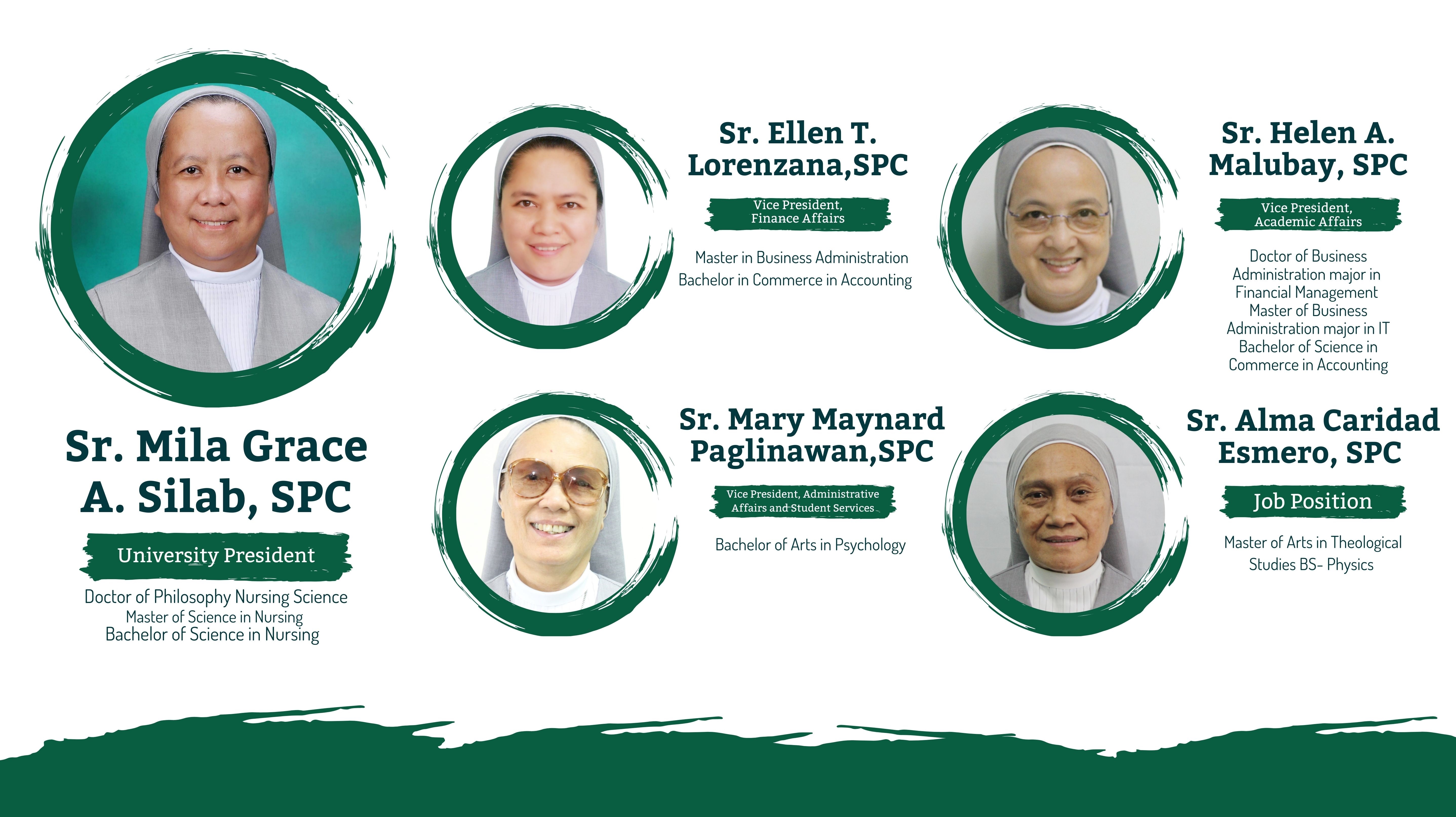
OFFICE OF THE PRESIDENT

OFFICE OF THE ACADEMIC AFFAIRS

CHRISTIAN FORMATION OFFICE

ADMINISTRATIVE DIVISION
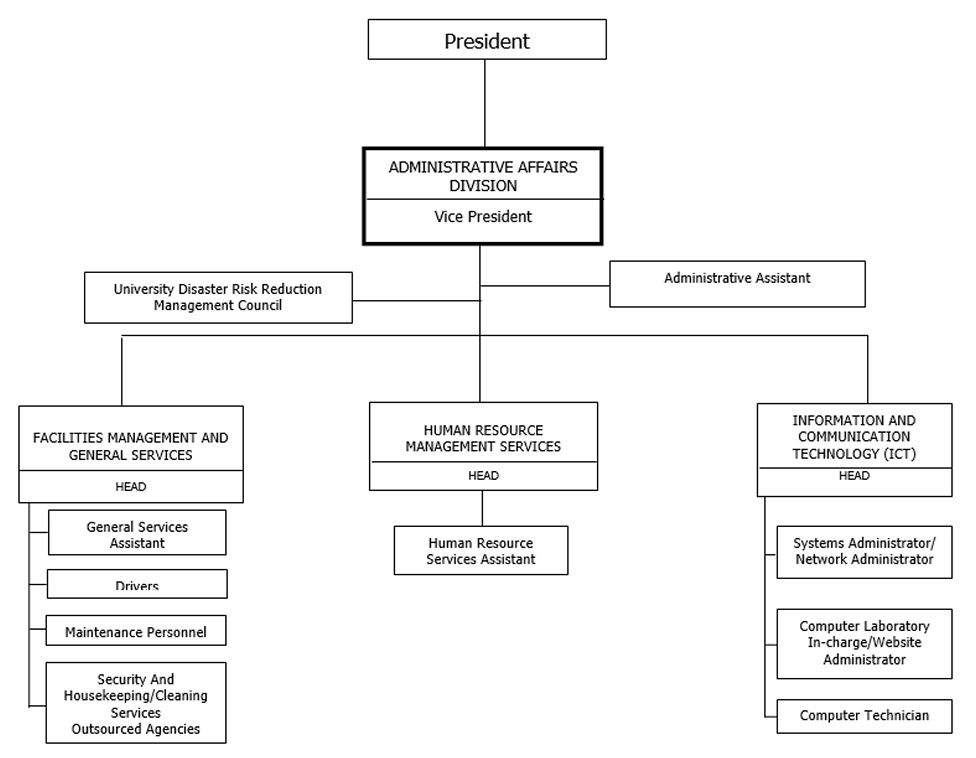
FINANCE AFFAIRS

MIDDLE ADMINISTRATION
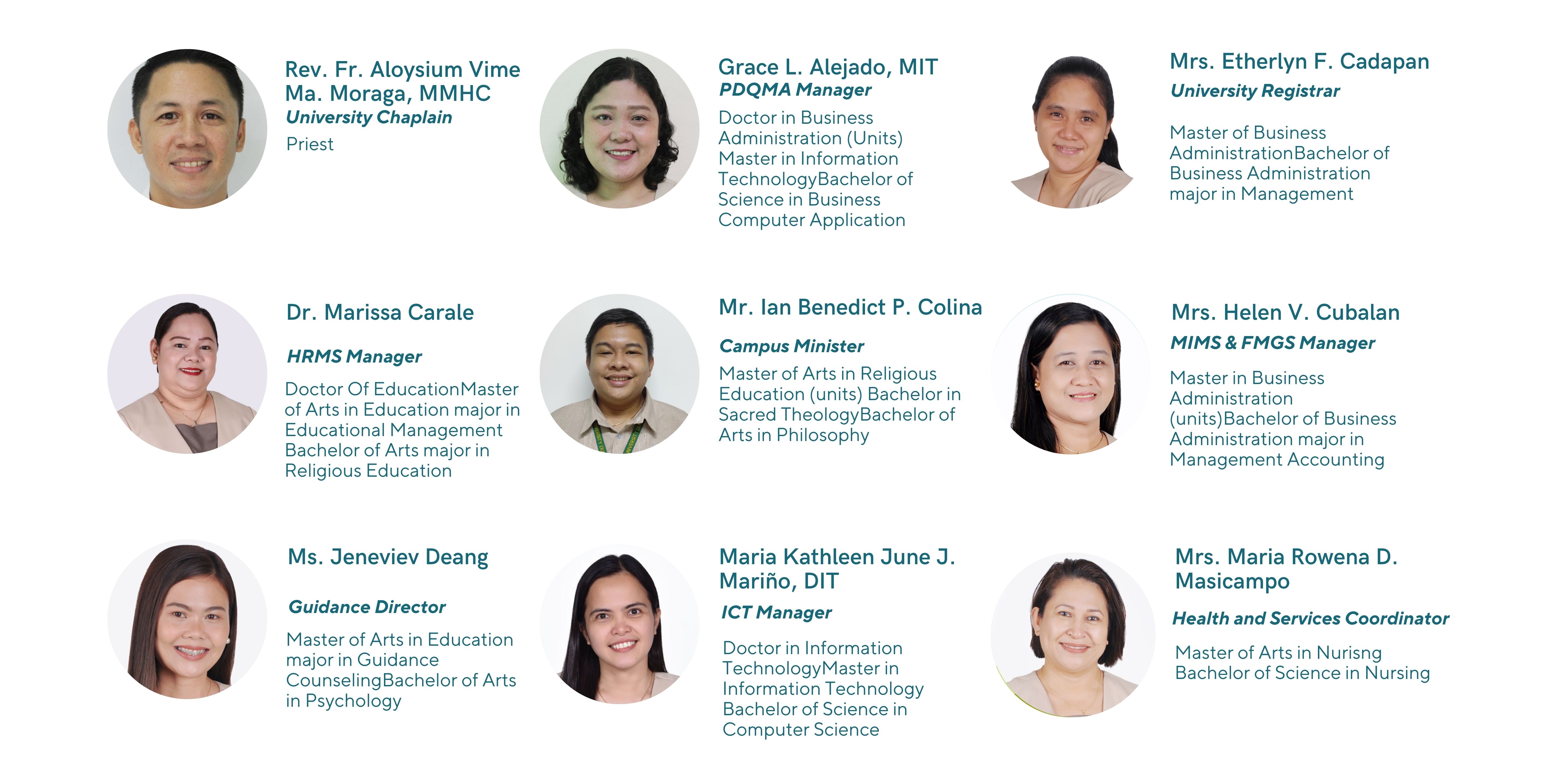
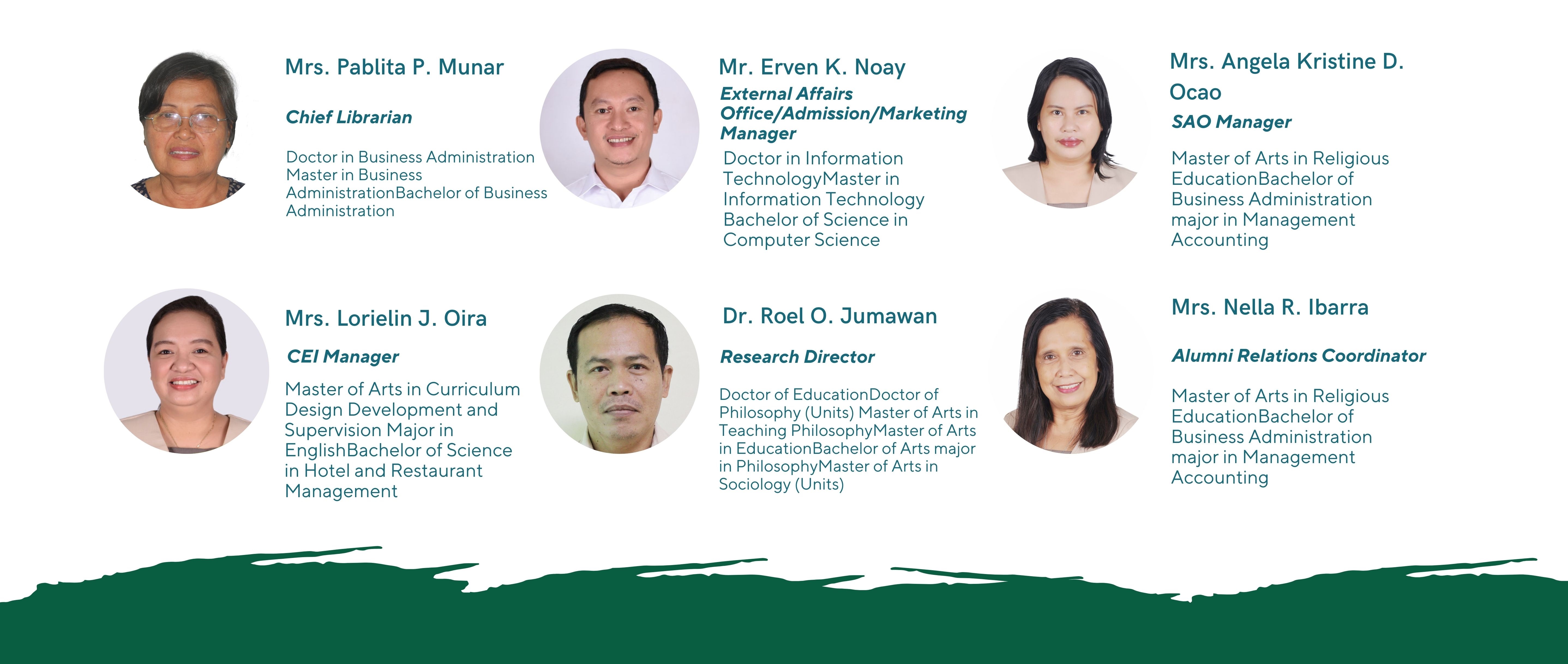
SPU Dumaguete GOVERNING BOARD
Following the data privacy act, the names and pictures of the Board of Trustees are presented below:

Chairman of the Board of Trustees
Sr. Emily Louise Del Castillo, SPC, is the Provincial Superior of the Sisters of St. Paul of Chartres in the Philippines and also serves as the First Assistant General of the Congregation. She has extensive academic training, with a Master of Arts in Theological Studies, and a Master of Arts in Educational Management. She has also completed special training in Biblical Formation at ECCE Home in Jerusalem and has studied Theology at Regina Mundi in Rome, Italy. Additionally, she holds a Bachelor’s degree in Education, reflecting her dedication to faith and educational leadership.

Vice-chairman of the Board of Trustees
Sr. Ma. Nilda is currently the President of St. Paul University Quezon City and the Provincial Assistant for Education. She was the former President of St. Paul University Dumaguete. She has been a member of the Board of Trustees since July 2014 up to the present. She is the beacon of excellence having finished the degree of Doctor of Education major in Educational Management; Master of Arts in Home Economics; and Bachelor of Science in Elementary Education.

Member of the Board of Trustees
Sr. Adelina is currently the Provincial Assistant for Health Care at St. Paul Hospital Tuguegarao, Tuguegarao City. She has been a member of the Board of Trustees since July 2019 up to the present. She is the beacon of excellence having finished the degree of Master in Hospital Administration; Master of Arts in Nursing; Master of Arts in Global Health Care Leadership; and Bachelor of Science in Nursing.

Member of the Board of Trustees
Sr. Merceditas is currently the President of St. Paul University Philippines, Tuguegarao City. She has been a member of the Board of Trustees since January 2021 to January 2024. She is the beacon of excellence having finished the degree of Doctor of Philosophy in Educational Leadership; Master of Arts in Educational Management; Bachelor of Laws; and Bachelor of Science in Psychology.

Member of the Board of Trustees
Sr. Maria Consuelo Celis, SPC, serves as the Assistant Provincial for Pastoral Care of the Congregation of the Sisters of St. Paul of Chartres, Philippine Province. With a Master of Arts in School Counseling and a Bachelor of Science in Commerce (Management), she combines her expertise in counseling, commerce, and spirituality to lead the congregation’s mission, focusing on the most neglected. Under her guidance, the SPC Pastoral Ministry supports the sick, youth, elderly, families, and indigenous communities across seven Pastoral Care Centers, actively responding to the Church’s call for integral evangelization.

Member of the Board of Trustees
Sr. Marie Rosanne is currently the President of St. Paul University Surigao in Surigao City. She has been a member of the Board of Trustees since July 2014 up to the present. She is the beacon of excellence having finished Post-Doctoral Studies in Advanced Educational Planning and Alternative Educational Delivery System; Doctor of Philosophy and master’s in development education; Graduate Studies in Theology; and Bachelor of Education/ Bachelor of Arts.
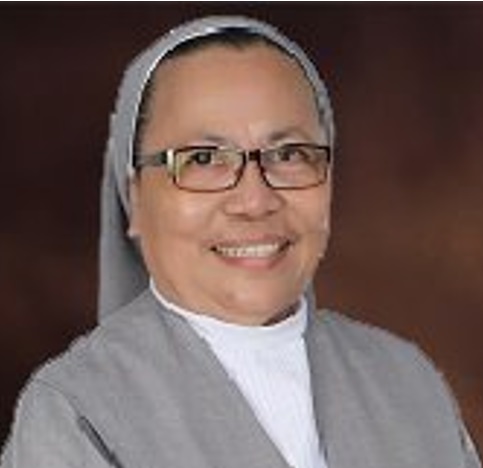
Member of the Board of Trustees
Sr. Ruby is currently the Provincial Bursar of Our Lady Chartres Convent in Antipolo City. She has been a member of the Board of Trustees since September 2017 up the present. She is the beacon of excellence having finished the degree of Master in Business Administration; and Bachelor of Science in Business Administration major in Accounting.
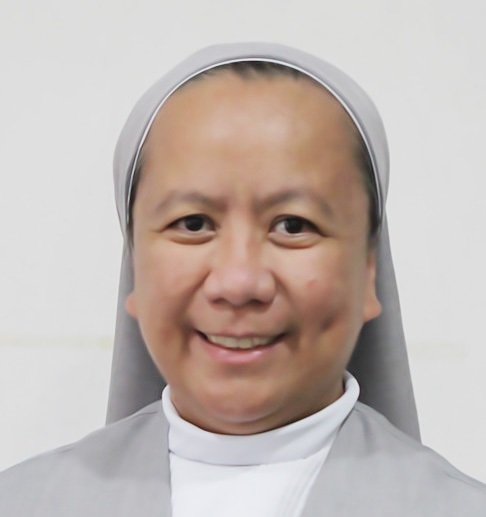
University President
Sr. Mila Grace is currently the President of St. Paul University Dumaguete. She has been a member of the Board of Trustees since September 2022 up to the present. She is the beacon of excellence taking Doctor of Philosophy in Nursing Science (on-going); Master of Science in Nursing major in Nursing Administration; and Bachelor of Science in Nursing.
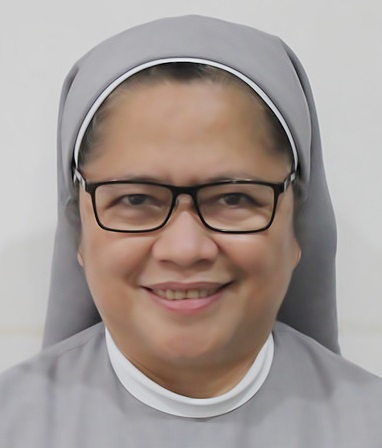
Local Superior / Vice-President for Finance
Sr. Ellen is currently the Local Superior and the Vice-President for Finance Affairs at St. Paul University Dumaguete. She has been a member of the Board of Trustees since June 2019 up to the present. She is the beacon of excellence taking Doctor in Business Administration (on-going); Master in Business Administration; and Bachelor of Science in Business Administration major in Accounting.

Member of the Board of Trustees
Dr. Rozzano C. Locsin, RN, FAAN, is a Professor Emeritus at Florida Atlantic University, widely respected in the field of nursing. He holds a Doctor of Philosophy in Nursing, a Master of Arts in Nursing, and a Bachelor of Science in Nursing. Dr. Locsin’s extensive academic and professional contributions have made a significant impact on nursing education and practice, and his dedication to advancing healthcare has earned him recognition as a Fellow of the American Academy of Nursing.

Member of the Board of Trustees
Prof. Alpasa is currently the Chief Strategist of the Xavier & Associates for Delivering Transformative Solutions located in Mandaluyong City. He has been a member of the Board of Trustees since January 2019 up to the present. He is the beacon of excellence having finished his Master of Arts in Theology; Master of Arts in Philosophy, Education and Communication; Master of Arts in Applied Business Economics; Master in Business Management (with units);Master in Business Administration; and Bachelor of Science in Commerce major in Economics.

Member of the Board of Trustees
Ms. Milan is currently the Education Marketing Lead of Microsoft 365. She has been a member of the Board of Trustees since January 2020 up to the present. She is the beacon of excellence having finished the degree of Consumer Marketing-Kellogg, Graduate School of Management (Chicago); Master in Business Administration major in Marketing; and Bachelor of Science and Commerce major in Information Technology.

Member of the Board of Trustees
Atty. Padilla III is the university’s lawyer. He has been a member of the Board of Trustees since January 2021 up to the present. He is the beacon of excellence having finished the degree of Master of Laws; Bachelor of Laws; and Bachelor of Arts in Economics.
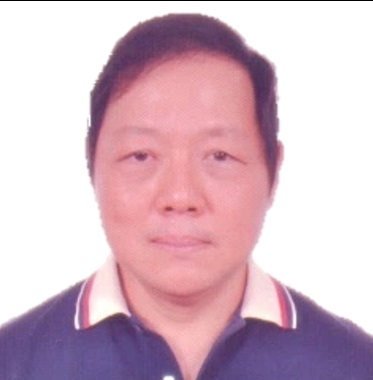
Member of the Board of Trustees
Engr. Uymatiao is currently a businessman in Dumaguete City. He has been a member of the Board of Trustees since January 2021 up to the present. He is the beacon of excellence having finished the degree Master of Arts in Finance at University of Pennsylvania; Master of Business Administration; and Bachelor of Science in Mechanical Engineering

Member of the Board of Trustees
Dr. Santos is currently the residing in 28-I The Currency Condominium at Julia Vargas Avenue corner Garnet Road Ortigas CBD, Pasig City. She has been a member of the Board of Trustees since January 2020 up to the present. She is the beacon of excellence having finished the degree on Doctor of Education major in Educational Management; Master of Arts in Educational Management; and Bachelor of Science in Education.
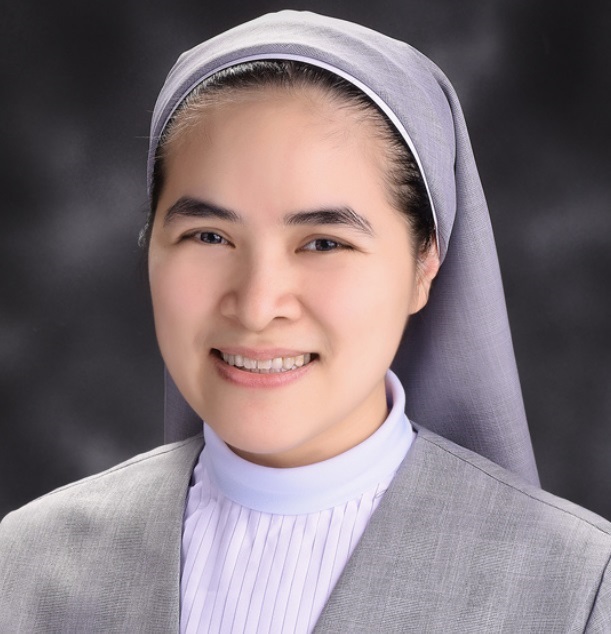
Corporate Secretary
Sr. Maria Althea is currently the Principal of the Basic Education Department. She has been the corporate secretary since Year 2022 up to the present. She is a beacon of excellence having finished her Masters degree in Administration and Supervision; and Bachelor of Science in Commerce major in Economics.
EDUCATIONAL PROGRAM
(Student Population for each program and accreditation level)
The Basic Education of St. Paul University Dumaguete offers the following program for the school year 2024-2025:

5- YEAR ENROLLMENT PROFILE
(5-Year for Resurvey Visit)
Below is the summary of enrollment data per year level of the program for a 5-year resurvey visit:
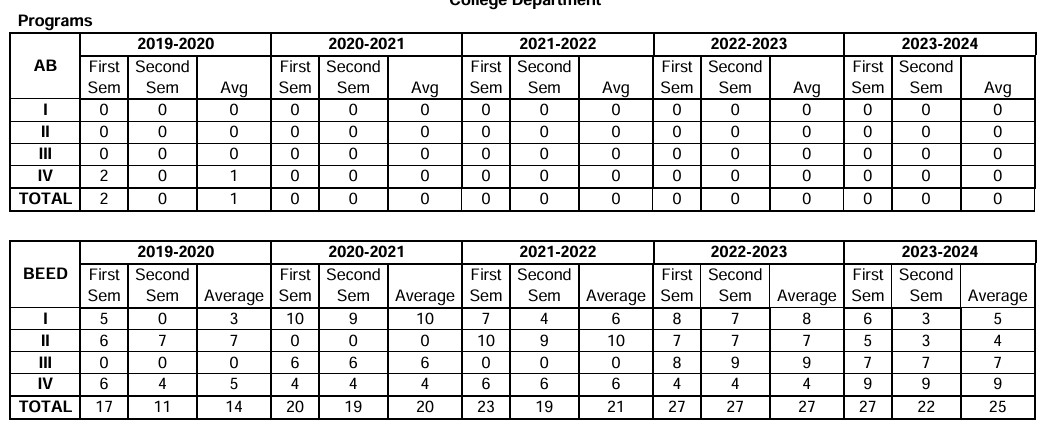
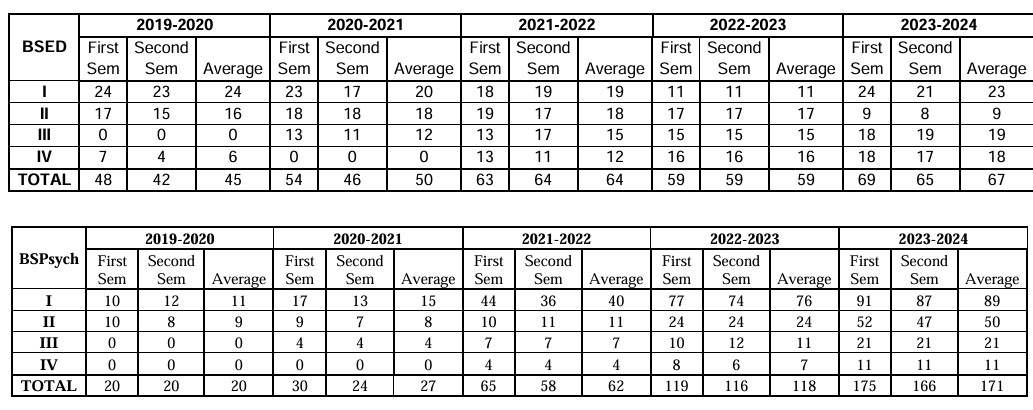

There was a substantial decrease in enrollment during the pandemic period.
VII. REGULATORY ENVIRONMENT
Embodying the missionary zeal of the Sisters of St. Paul of Chartres, St. Paul University Dumaguete remains dedicated to the transformative mission of education. With a strong commitment to evangelization through Paulinian education, the university wholeheartedly embraces the charism inspired by its Congregation's Founder, Fr. Louis Chauvet. Moreover, the institution steadfastly upholds all relevant educational laws, ensuring a comprehensive and compliant educational experience.
St. Paul University Dumaguete operates within the framework of regulatory bodies to ensure the quality of education, promote academic standards, and safeguard the welfare of students.
As a university, it adheres to the Commission on Higher Education (CHED), its set policies, standards, and guidelines for the establishment and operation of universities and colleges.
SPUD’s Basic Education is under the regulation of the Department of Education (DepEd), as the primary government agency responsible for regulating and overseeing basic education in the Philippines. Our institution observes its formulated policies, standards, and guidelines for curriculum development, teacher qualifications, school facilities, and student welfare.
These include compliance with additional regulations and requirements set by local regulatory authorities such as permits, licenses, and inspections from local government units (LGUs) or regional offices of the DepEd, ensuring adherence to health and safety standards, zoning regulations, and compliance with local laws.
Ensuring that our teachers meet the professional ideals set for educators, we abide by the standard set by the Professional Regulation Commission (PRC). (List of Faculty and their PRC IDs)
The Basic Education Department upholds the Child Protection Policies to safeguard the welfare and rights of students. These policies address issues such as child abuse prevention, reporting mechanisms, and protocols for dealing with child protection concerns as stated in the handbook and in pursuant of DepEd Order No. 40 Series of 2012.
The University also benefits from the Government Assistance to Students and Teachers in Private Education (GASTPE) Program, administered by the Private Education Assistance Committee (PEAC). This program collaborates with the Department of Education (DepEd) to offer vital financial aid, scholarships, and subsidies to eligible students and teachers within private basic education institutions.
STRATEGIC CHALLENGES
With the current trends in education, the department identified some concerns which seemingly impact the teaching-learning processes and operation in the school as crafted in the Key Result Areas (KRA).
KRA 1:
The learners and teachers manifest an undeniable need for spiritual formation, which implies an awareness and greater appreciation of the Paulinian Formation. This need is being addressed by the Paulinian Roots, Identity, Spirituality and Mission (PRISM) Formation. PRISM, an acronym for Paulinian Roots, Identity, Spirituality, and Mission, serves as the fundamental essence of the university's being. This transformative initiative was spearheaded by the SPC Education Ministry and is deeply ingrained as a pivotal Key Result Area within St. Paul University Dumaguete's framework.
At its core, PRISM is designed to cultivate values not only among students but throughout the entire community. This endeavor involves a profound introspection, encouraging us to revisit and embrace our authentic identity as Paulinians. It prompts us to reflect on our origins and rediscover the essence of who we are. Through this program, we collectively embark on a journey of self-discovery and reconnection, fostering a stronger sense of purpose and belonging.
KRA 2:
The implementation of Outcomes-Based Education (OBE), pioneered by the SPCEM and subsequently extended to the SPC schools, marks a significant advancement in our educational approach. This curriculum is designed to visibly showcase each learner's anticipated accomplishments upon concluding their educational journey.
The transition to OBE posed an initial challenge, particularly in formulating Curriculum Maps and Learning Plans using the OBE Format. However, proactive measures were taken to adeptly manage this paradigm shift through vigilant oversight and supportive mentorship. To ensure the seamless execution of OBE, we introduced the Consultation Activities for Learning and Leveling (CALL). This component, accessible asynchronously, provides a dedicated space for independent learning, allowing students to engage in productive consultations with teachers and foster collaborative interactions with peers.
KRA 3:
The imperative for iNnovation has been ignited to uphold and sustain the exceptional standard of education synonymous with a skilled and enlightened Paulinian, poised to serve both the Church and society. In response, a series of initiatives have been undertaken to ensure our educational excellence remains unwavering.
Comprehensive training and enrichment sessions encompassing emerging technologies, pedagogical advancements, and the intricacies of blended learning were thoughtfully orchestrated for administrators and faculty members. A tailored mentoring program was artfully designed to provide invaluable support to new educators as they navigate their roles within the institution.
To fortify the research capabilities of our students and broaden their knowledge horizons, subscriptions to eLibrary platforms such as Ebsco and Odilo were seamlessly integrated. In the realm of virtual learning, we harnessed the power of diverse Learning Management Systems including Quipper, Orange App, and Mteams. The re-introduction of Robotics into our curriculum signifies an ongoing commitment to nurturing critical thinking skills among our learners, a journey that continues into the current academic year.
Addressing a prevalent challenge faced by educational institutions nationwide, we have implemented Prime English—an empirically-backed Reading Program. This strategic intervention addresses the imperative need to enhance the literacy skills of our students, positioning them as highly productive and globally competitive individuals, poised to make meaningful contributions to our interconnected world.
KRA 4:
The Unified and Sustainable Management (USM) framework embodies a spirit of harmony and collective effort directed towards a shared objective. Under this framework, the department has orchestrated a series of strategies aimed at optimizing resources and cultivating sustainable practices.
These strategies encompass vigilant oversight of classrooms, ensuring optimal utilization and upkeep of essential facilities such as chairs, tables, HDMI equipment, TVs, HEPA filters, alcohol dispensers, and temperature scanners. A conscientious approach to resource consumption is upheld, reflected in practices such as the use of scratch paper for internal documents, the regulated operation of air conditioning units from 8:30 am to 4:00 pm, and the responsible closure of faucets and lights when not in use.
Moreover, the department demonstrates a commitment to effective financial management through the strategic handling of accounts receivables. This involves the implementation of permits during examination periods and the consistent communication of reminders to students and parents regarding outstanding accounts. Through these concerted efforts, the USM framework ensures a cohesive and sustainable approach to management, fostering a culture of prudent resource utilization and responsible financial practices.
The four Key Result Areas give us the direction to focus on our improvements and address challenges so that a very satisfactory efficacy can be achieved. (KRA 2019-2020; 2020-2021; 2021-2022; 2022-2023).
The call for each one is to hop in this journeying together and as co-sojourners toward one direction, one vision, and one mission, we proclaim Jesus Christ as the Good New in all that we do. We continue to commit with zeal and pursue what we have been commissioned – a non-mediocrity in achieving the mission.